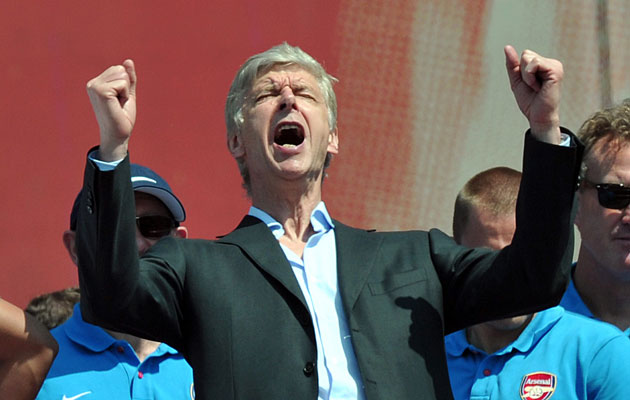You have to wonder whether Arsène Wenger’s infamous assertion that he ‘did not see’ the fouls committed by Patrick Vieira and co. in the early 2000s should have perhaps been taken at face value. After all he appears to have developed a similar blind spot in not seeing the necessity to ever again sign a player in the same mould as the French midfield enforcer.
Then there’s the debate raging over Mesut Özil, a player whose signing, off the pitch, was a priceless symbol of Arsenal’s re-established authority in the transfer market, but whose effectiveness on it since has looked a tired shadow of the maestro last seen consistently pulling the strings in Madrid.
So where does all this leave Arsène Wenger? It is a strange day when Paul Merson, who expressed his frustration at recurring defensive frailties in the wake of the 2-0 drubbing in Dortmund, is sounding wiser than the wily old French owl.
Is Steve Bould, the former defender now assistant at Arsenal, pointing these organisational deficiencies out to Wenger, or is it his influence alone that is stopping Jack Wilshere and Alex Oxlade-Chamberlain from being deployed in the heart of Arsenal’s central defence?
Arsène Wenger is one of the greatest orchestrators of attacking football in the history of the game. If he were a composer then his 2004 unbeaten Invincibles would surely be his landmark album, while the following years have seen the release of several less commercially viable, though no less artistically thrilling, conceptual pieces.
Over at Chelsea José Mourinho is the formulaic producer of commercial success who will sell his product year after year with relentless efficiency. He is Oasis. Or, if you prefer, JK Rowling.
But what inspires more – JK Rowling or Leo Tolstoy?
Marcelo Bielsa’s brand of pressing football was hugely influential on, among others, Mauricio Pochettino and that astounding Barcelona side managed by Pep Guardiola. Yet the Argentine has won no trophies in Europe because he has no Mourinho like obsession over his own medal haul: he once turned down the opportunity to manage Inter Milan in favour of the greater challenge that Athletic Bilbao presented.
Greece’s Euro 2004 victory was an extraordinary achievement. But does anyone really remember who scored their winning goal in the final against Portugal?
If football is about inspiring with beautifully crafted goals and periods of play (it is) then Wenger and Bielsa are both light years ahead of Mourinho, who was always doomed to be fired by Real Madrid for his pragmatic tactical principles that conflict so transparently with the identity of the club.
Some of the greatest goals in the Premier League have been courtesy of Wenger’s philosophy, from Dennis Bergkamp’s pirouette against Nikos Dabizas in 2002 (a move started, incidentally, by a tackle from Vieira) to Jack Wilshere’s final touch in that mesmerising team move against Norwich last year (a goal which Mesut Özil, while on the pitch, was not directly involved in).
If you think football is purely about winning then you will probably reel off José Mourinho’s statistics (perhaps before listening to the latest Oasis album and then waiting for the inevitable release of Harry Potter and The Mid Life Uncertainty to herald the beginning of a brand new 24 book series.)
Of course there is nothing wrong with enjoying Harry Potter more than Anna Karenina.
But one survives, inspires and becomes immortalised in a way that the other does not.
Like Guardiola and Biesla before him, Arsène Wenger is the football managing equivalent of an artist, complete with all the flaws that entails. Most notably, in his case, his obstinacy over not buying a top quality defensive midfield player.
For all his assets Mikel Arteta is an ill fitting suit of a defensive midfielder – rather fetching and undoubtedly well made, but ultimately uncomfortable and incapable of providing the required cover when his team need to be looking their very best.
Oh and it was Angelos Charisteas who scored Greece’s winning goal in the final of Euro 2004.
Perhaps it was a remarkable piece of play, but I for one confess that I don’t remember it.
By James Cook






